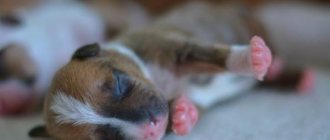Are you interested in: “ Why does my puppy urinate often ?” Protecting your animal from a number of ailments is sometimes not as difficult as it seems at first glance and can even lead to panic. Moreover, today there is an excellent lifesaver for those owners who are not particularly versed in veterinary issues - veterinary centers. When, upon returning home, you notice puddles on the floor, it can’t help but upset you, especially if these puddles are left behind by a very small puppy. This is a signal to think about what is happening to his health, so the problem needs to be dealt with consciously.
The most common reasons why your puppy urinates frequently
Usually, if a puppy urinates frequently, this is not always a problem, but there are a number of reasons that will still indicate it. The first of these includes his age, for the reason that small puppies have not yet learned to perfectly control their bladder. And if at the same time the puppy is afraid of something, the result will be involuntary urination. The only way out of this situation will be when the puppies grow up a little, they learn to take control of their body, their instincts and will no longer cause such incidents to their owners. This usually occurs within three to four months.
The next reason is raising the animal . There's a lot to talk about here. Education is almost the dominant factor, which the owners of the animal should be fully concerned with at first. Moreover, ideally, start the process as soon as the puppy gets into the apartment.
Thus, a puppy trained to pee on a diaper in a timely manner will no longer leave behind small or not very large puddles throughout the apartment. To ensure that your puppies pee in their designated area, train them right away rather than waiting 5 months or more. If you do not have sufficient skills to teach your puppy this task on your own, then you can always turn to a dog trainer for help and practical advice.
Another common reason
, which may shed light on the question of why your puppy urinates often - is it a banal
fright , or fear factor .
Such situations cause both the intestines and the animal’s bladder to reflexively contract, and consequently, the puppy may wet itself. A small puppy may begin to urinate even at the sight of its owner. Therefore, it is necessary to show such a pet much more care so that in any stressful situation the puppy can feel calm and comfortable. Also, the reason that the puppy urinates much more often than usual is due to the peculiarities of the hormonal system . Most often this, of course, concerns bitches. If you are the owner of a female puppy, then you should remember this nuance: females can urinate for about one and a half to two years. Why is this happening? The answer here is that even by the time he reaches adulthood, the formation of his hormonal system is not completed. The reasons here may lie in:
- poor nutrition;
- lack of consumed vitamins;
- heredity.
How many times a day can a puppy urinate?
Typically, the norm in this matter is if your puppy urinates ten to twelve times a day if he is three months old. If the puppy is already 6 months old, then its daily rate of trips to the toilet is slightly reduced and is eight times, and six to seven times a day if the puppy is already more than six months old.
Meeting new dogs
Supervise your dog when he meets new dogs. If your dog is wagging his tail and he seems interested, you can allow your dog to approach slowly as long as the other dog is willing.
If your dog is showing signs of aggression or fear, you must remove the dog from the situation.
Teach your dog to associate meeting a new dog with praise and treats, this will teach him something positive.
If your dog needs more time during training, be sure to use the "sit" command or keep your distance from other dogs.
Do age-related changes cause a puppy to urinate frequently (dog)
Of course, the changes that an animal’s body undergoes associated with age also affect its frequency of urges to the toilet. Because the older the pet becomes, the more its smooth muscles weaken. In this particular case, help will only be provided by treatment with special supportive agents, which can only be prescribed by a veterinarian.
If you encounter a similar problem, you can seek a full, detailed consultation with us at the veterinary center, where high-level specialists will literally explain to you the essence of the current situation, as well as ways to overcome it. And if you don’t have time, then just call the reception and call a veterinarian to your home. He will provide all the necessary documents plus licenses upon arrival.
Pay attention to your animal how much water it drinks per day, because another reason may be that the pet drinks too much water and then urinates too often. Also notice what color your animal’s urine is, because its transparency is the main indicator of whether your puppy is suffering from a disease such as cystitis.
- Signs of cystitis in a dog are as follows:
- the animal often urinates, although it does not drink liquids excessively, in small portions, and also whines;
- droplets of blood and/or pus are clearly visible in the urine;
- lethargy;
- refusal to eat;
- elevated body temperature.
If you notice at least a couple of the listed symptoms in your pet, immediately seek advice and treatment from a veterinarian. It's really not worth the wait.
Presence of deviations
The cat often goes to the toilet a little at a time
If your pet urinates a lot for a long time, then you should think about pathological urinary incontinence. Pathological deviations are divided into two large groups: false and true.
Uncontrollable urination in dogs
- True incontinence is the involuntary emptying of the bladder in the absence of serious developmental pathologies or diseases of the genitourinary system.
- False incontinence includes deviations accompanied by serious developmental disorders or diseases of the ureter, bladder or urethra.
True incontinence is predominantly acquired and its development is provoked by urolithiasis, the development of malignant neoplasms in the urinary tract, inflammation of the bladder, the consequences of sterilization/castration, spinal injuries and polydipsia.
Why does an animal develop cystitis, what are the prerequisites?
- A disease called cystitis often occurs in an animal due to the fact that it sleeps in a draft. To eliminate this unpleasant moment, take care in advance to provide the animal with a rug or bedding.
- When the weather is damp and chilly, and also quite cold, then limit walks with your four-legged friend outside.
- Don't bathe him in cold water either.
- Chlamydia or E. coli entering your pet's urethra can cause cystitis. However, this can only occur when the puppy’s immunity declines.
- Improper nutrition of an animal leads to the formation of salt crystals in its urine. It is important to monitor the amount of liquid consumed; the puppy should drink plenty of it, but not excessively! The puppy must follow a diet. This way he will have a normal metabolism.
- It is necessary for the puppy to observe the rules of hygiene of the external genitalia. The animal does not learn this moment immediately, so in the first couple of days he will need help.
Dachshunds are perhaps the most susceptible to cystitis, but if you follow all the above points, it can be avoided or at least prevented in time. If the animal is already sick, then treatment in the form of antibiotics will be needed. If the disease has been neglected for some reason, then there may be more than one course of drug therapy, sometimes the duration of treatment can be a month, but it is important not to abandon it at the first favorable changes, but to complete everything, thereby securing the result.
A small puppy as young as 4 months old may begin to urinate excessively due to a cold. Therefore, until the cold symptoms go away, normal urination in the animal will not be restored. Take a closer look if your puppy begins to drink large amounts of water and urinate a lot. It will never be a bad idea to seek help from our veterinarian, especially if you suspect that your puppy often urinates for a reason.
How to Choose the Best Leash for Your Dog
When you go for a walk, you want to be in control of your dog. Therefore, during a walk you will need a strong leash one and a half to two meters long. You can choose any leash that is comfortable for you.
Leather or nylon rope leashes are best for long walks so you can quickly control your dog in unexpected situations.
The retractable leash is easy to hold and perfect for taking your dog's potty breaks or for walking your dog on a leash. This is not good for large dogs or those that pull a lot.
If you struggle with your dog pulling on you on walks, a no-pull harness may be a good alternative. These harnesses and a strong leash give you more control over your dog during training.
On this topic:
How to stop a dog from pulling on a leash
How to accustom a puppy to a leash and collar
Diagnosis and treatment
Before treating your pet, undergo a full examination at a veterinary clinic. If you suspect a pathology, provide the doctor with all information regarding the contents and individual characteristics of the four-legged patient. To make a diagnosis, standard methods are used: clinical examination, blood and urine tests, ultrasound and x-rays.
If the dog’s condition is not in danger, then therapy is carried out at home. In more severe cases, hospitalization is recommended.
At the veterinary clinic
If the elasticity of the sphincter is lost, muscle tone is restored by collagen injections, tissue suturing, or changing the position of the bladder.
To treat polydipsia, which leads to impaired renal function, the patient is administered vasopressin. This hormone reduces the amount of urine by regulating the concentration of fluids in the body. More detailed treatment depends on the root cause that led to the development of the pathology.
Most injuries are treated with medication. Pain and inflammation are relieved with the help of muscle relaxants, steroids, painkillers and sedatives. Surgical intervention is provided only in advanced cases when other treatment methods are powerless.
If an infection is associated with cystitis, then a course of antibiotics is prescribed to destroy it. Bleeding is blocked with drugs that stop the flow of blood. The first improvements occur a couple of days after the start of therapy. Despite this, it is prohibited to interrupt the course of medication until directed by a veterinarian.
Therapy for ICD is based on the type of formation. Struvite and oxalates are most often diagnosed. If there is excessive accumulation of urine, catheterization is performed. In addition to special medications, a change in diet, a lifelong diet and monitoring of sufficient fluid intake are recommended. During therapy, a preventive urine test is required.
Diseases of the uterus and reproductive system of the bitch are treated based on the cause. For this purpose, anti-inflammatory drugs, immunostimulating and highly specialized medications are used.
Diabetes requires a constant diet and a lifelong course of medications to maintain the pet's level of condition.
Self help
If the animal is in severe pain, give it an approved pain reliever. Banned analgesics from the human medicine cabinet include Paracetamol, Ibuprofen and Aspirin - they are toxic to dogs and can be fatal. If you are not well versed in medications, call your veterinarian.
Failure to urinate for 24 hours can lead to death, so do not hesitate to visit a veterinary clinic. Despite the danger, it is forbidden to massage the bladder, insert a catheter, or give diuretics on your own. Inept actions will lead to organ rupture.
If the reasons for frequent urination lie in behavior, then the owner can and should eliminate them independently. Even if the animal is old enough, it can be trained to behave well-mannered and restrained.
Make your walk fun
The purpose of the walk is to stimulate your dog and keep him entertained. Make your walks more varied by taking your pet to new places. Choose fun places, like the dog park or a friend's house.
When you take your dog to a dog park or other off-leash play area, make sure he is taught the “come” command.
Practice getting your pet to come on command to make sure you can trust him without a leash.
You can also plan walks with other dogs and their owners. This creates a comfortable social environment.
Give them time to sniff and let them explore the area. Sniffing mentally stimulates your dog and relieves anxiety.
How many times should a puppy pee a day?
A puppy can be compared to a human child: both have a much faster metabolism than an adult dog and an adult human, which is why babies go to the toilet often.
However, everything is very individual for each kitten and depends on various factors. Depending on the age of the baby, the amount of water he consumed per day, the air temperature in the environment where he is, what method you prefer in feeding the puppy - natural food or dry food, and the frequency of your baby's walking will depend on toilet. But on average it varies from 5-6 to 10 urinations per day .
Content
Owners often have difficulty tolerating puppies, wiping up drops of urine left behind due to a lack of understanding of the exact location or boundless joy. But it can also manifest itself in adulthood due to numerous health problems. The dog understands perfectly well that this is unpleasant for a person, but it cannot do anything about this condition. The animal is unable to control the bladder sphincter. Improper urination also means excessively frequent urge. The owner cannot walk the pet endlessly on the street, so you need to look for a way out of the situation, closely engage in treatment and eliminate the generating factor. The severity of the problem can range from the common cold to fatal diseases











